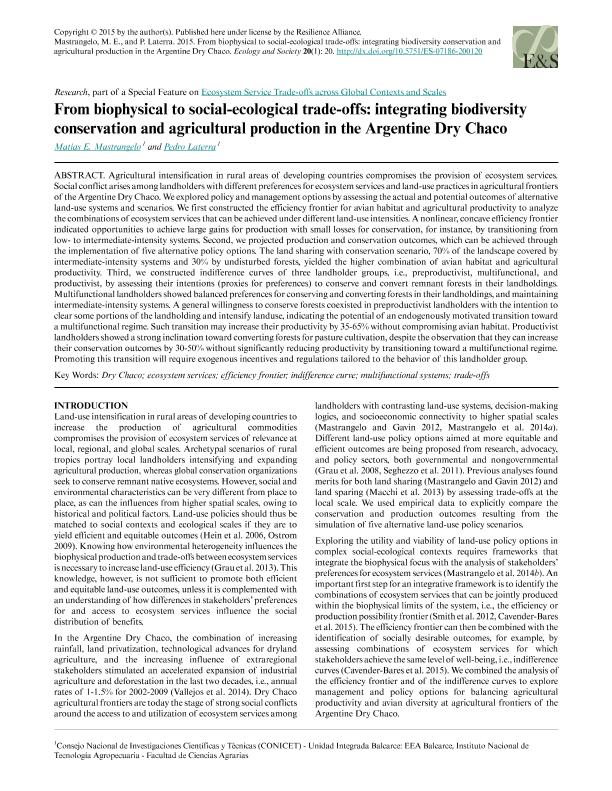Mostrar el registro sencillo del ítem
dc.contributor.author
Mastrangelo, Matias Enrique

dc.contributor.author
Laterra, Pedro

dc.coverage.spatial
Chaco (Argentina)
dc.date.available
2018-03-19T15:42:50Z
dc.date.issued
2015-01
dc.identifier.citation
Mastrangelo, Matias Enrique; Laterra, Pedro; From biophysical to social-ecological trade-offs: Integrating biodiversity conservation and agricultural production in the Argentine Dry Chaco; Resilience Alliance; Ecology And Society; 20; 1; 1-2015; 1-20
dc.identifier.issn
1708-3087
dc.identifier.uri
http://hdl.handle.net/11336/39193
dc.description.abstract
Agricultural intensification in rural areas of developing countries compromises the provision of ecosystem services. Social conflict arises among landholders with different preferences for ecosystem services and land-use practices in agricultural frontiers of the Argentine Dry Chaco. We explored policy and management options by assessing the actual and potential outcomes of alternative land-use systems and scenarios. We first constructed the efficiency frontier for avian habitat and agricultural productivity to analyze the combinations of ecosystem services that can be achieved under different land-use intensities. A nonlinear, concave efficiency frontier indicated opportunities to achieve large gains for production with small losses for conservation, for instance, by transitioning from low- to intermediate-intensity systems. Second, we projected production and conservation outcomes, which can be achieved through the implementation of five alternative policy options. The land sharing with conservation scenario, 70% of the landscape covered by intermediate-intensity systems and 30% by undisturbed forests, yielded the higher combination of avian habitat and agricultural productivity. Third, we constructed indifference curves of three landholder groups, i.e., preproductivist, multifunctional, and productivist, by assessing their intentions (proxies for preferences) to conserve and convert remnant forests in their landholdings. Multifunctional landholders showed balanced preferences for conserving and converting forests in their landholdings, and maintaining intermediate-intensity systems. A general willingness to conserve forests coexisted in preproductivist landholders with the intention to clear some portions of the landholding and intensify landuse, indicating the potential of an endogenously motivated transition toward a multifunctional regime. Such transition may increase their productivity by 35-65% without compromising avian habitat. Productivist landholders showed a strong inclination toward converting forests for pasture cultivation, despite the observation that they can increase their conservation outcomes by 30-50% without significantly reducing productivity by transitioning toward a multifunctional regime. Promoting this transition will require exogenous incentives and regulations tailored to the behavior of this landholder group.
dc.format
application/pdf
dc.language.iso
eng
dc.publisher
Resilience Alliance

dc.rights
info:eu-repo/semantics/openAccess
dc.rights.uri
https://creativecommons.org/licenses/by-nc-sa/2.5/ar/
dc.subject
Dry Chaco
dc.subject
Ecosystem Services
dc.subject
Efficiency Frontier
dc.subject
Indifference Curve
dc.subject
Multifunctional Systems
dc.subject
Trade-Offs
dc.subject.classification
Otras Ciencias Biológicas

dc.subject.classification
Ciencias Biológicas

dc.subject.classification
CIENCIAS NATURALES Y EXACTAS

dc.title
From biophysical to social-ecological trade-offs: Integrating biodiversity conservation and agricultural production in the Argentine Dry Chaco
dc.type
info:eu-repo/semantics/article
dc.type
info:ar-repo/semantics/artículo
dc.type
info:eu-repo/semantics/publishedVersion
dc.date.updated
2018-03-02T14:08:08Z
dc.journal.volume
20
dc.journal.number
1
dc.journal.pagination
1-20
dc.journal.pais
Canadá

dc.journal.ciudad
Ottawa
dc.description.fil
Fil: Mastrangelo, Matias Enrique. Instituto Nacional de Tecnología Agropecuaria. Centro Regional Buenos Aires Sur. Estación Experimental Agropecuaria Balcarce; Argentina. Consejo Nacional de Investigaciones Científicas y Técnicas; Argentina
dc.description.fil
Fil: Laterra, Pedro. Instituto Nacional de Tecnología Agropecuaria. Centro Regional Buenos Aires Sur. Estación Experimental Agropecuaria Balcarce; Argentina
dc.journal.title
Ecology And Society

dc.relation.alternativeid
info:eu-repo/semantics/altIdentifier/doi/http://dx.doi.org/10.5751/ES-07186-200120
dc.relation.alternativeid
info:eu-repo/semantics/altIdentifier/url/https://www.ecologyandsociety.org/vol20/iss1/art20/
Archivos asociados
